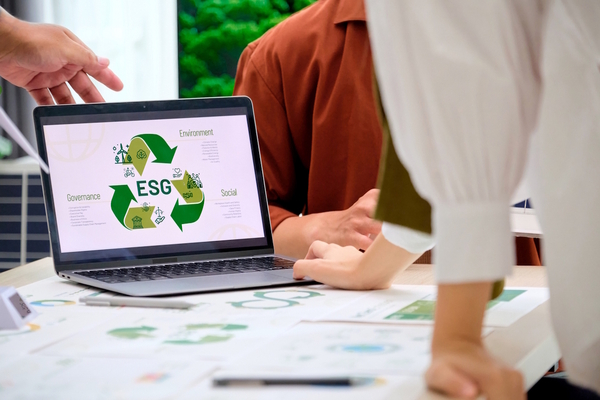You’re already making positive ESG decisions – don’t stop now
Sponsored by Inogen Alliance
We all understand the bigger picture. We all know that tackling the climate crisis needs to be at the very top of our global list of priorities. But the impact of the economy and energy crisis felt by businesses across Europe has left many companies experiencing paralysis when it comes to starting their sustainability journey.
In March 2022, the United Nations Office for Disaster Risk Reduction (UNDRR) published the Global Assessment Report (GAR 2022), which stated that by the year 2030 there will be 560 climate-related disasters globally per year – disasters such as extreme drought, wildfires, cyclones and floods. As the number of climate-related disasters increases, so does the economic cost to businesses. With an average cost of $170 billion per year across the world during the past decade, and the number of climate-related disasters predicted to continue to rise, companies must adapt to be resilient to the effects of extreme weather events.
When faced with challenges such as this, individual businesses must think about their own resilience. Our Associates at Inogen Alliance, including GEOtest, DGE Group and HPC, have clients that are looking for advice on how they can look at their own resilience as well as global impacts.
“ESG done well is not about ticking boxes and achieving ratings,” says Jordi Boronat, Managing Director of our Associate MediTerra Consultors Ambientals S.L. in Spain. “It’s about doing better business, increasing business resilience, identifying and mitigating risks and improving the future outcomes for your organisation. The big global drivers are clear. It impacts businesses on every level.”
According to Statistica (2022), 23 million businesses in the European Union are small to medium enterprises, with a further 5.3 million businesses in the UK. However, many do not have the resources to effectively implement environment, social and governance (ESG) or sustainability initiatives – factors crucial to a climate-resilient businesses.
Despite this, most companies throughout the Western world have already taken their first steps on their ESG and sustainability journey, with many making progress towards sustainable goals. Companies are no longer just waiting for policymakers to introduce incentives and regulations to make positive changes within their businesses. There’s a mutual benefit to taking climate action now. Committing to climate action, installing ESG policies and setting targets is no longer just an appeal to the modern investor, client and employee, but essential to climate resilience.
The first, most fundamental, step for businesses is to recognise that ESG and sustainability is good business, no matter the sector or industry. Investors are more focused on ESG factors, as green or sustainable investment increasingly influences the investment market. Taking the time to understand the risks and opportunities to business from the impacts of climate change equates to greater resilience and growth potential.
The good news is that most global businesses, and many regional ones, are already on their way to gathering the information needed for their benchmarking assessments, even if they don’t know it. If you’re worried you haven’t started your ESG process, and the very thought is daunting given the complexities involved, fear not.
It can be hard to see the wood for the trees with a myriad of regulatory frameworks and reporting standards, but simple steps can make starting the process a lot less daunting. Establishing which areas of ESG are most material to your organisation allows you to prioritise and place your time, effort and resources where it matters most to your business.
“One business isn’t going to change the world,” says Alex Ferguson, Managing Director of Lucion Group/Delta-Simons and Inogen Alliance Board member. “It’s about putting your efforts where you really can make a difference, and that’s the point of benchmarking and materiality. Focus on what you have the most impact on, and where you can make the biggest difference.”
Whether your business operations are local or international, to deal with both the simple and complicated you need good quality base-level data that is consistent, accessible and reliable. By asking the right people simple questions, you can begin to unlock the data you already have to get moving on your ESG journey. Simple information used well is powerful.
Establishing what is most materially relevant to your business, what information you have available, and how to make the most of that data is where expert ESG and sustainability-focused environmental consultants can help. By helping you attain and use your data, ESG and sustainability consultants enable good, informed decision-making. Such consultants offer businesses the opportunity to affect real change and facilitate their roles as industry leaders.
The Inogen Alliance is a global community of environmental, health, safety and sustainability (EHS&S) consulting firms. “The ultimate mission of Inogen Alliance is to make the world a safer, cleaner and more sustainable place,” says Angelique Dickson, President of Inogen Alliance. “By becoming the consultants of choice for multinational organisations determined to become climate resilient through implementing ESG and good sustainability practices, our client community can positively contribute to overcoming the challenges we face globally.”
Recently featured in the Global Thought Leaders campaign devised by TBD Media Group, the Inogen Alliance acknowledges that in our ever-evolving world, we don’t have all the answers, but we do have many of them. As global consultants, the Inogen Alliance sees the impact of climate change and the legacy of neglecting the environment across the world. We often advise on cleaning up contaminated sites, for example, and preparing for sustainable land and water use in the future.
And as we look to that future, one thing is clear: investors are increasingly focused on ESG factors as green or sustainable investment influences the investment market. While many investors are now showing caution regarding investment and divestment, plenty continue to push their assets under management (AUMs) to move to greener operations. Even during economic and energy crises, green business is increasingly seen as good business, and, after all, who wants to be knowingly unsustainable?
About Inogen Alliance
Inogen Alliance is a global network of environment, health, safety and sustainability consulting companies working together to help multinational organisations meet their global commitments locally. With offices located on every continent, more than 5,000 associates worldwide, and projects completed in more than 150 countries, Inogen Alliance provides unparalleled local consulting expertise, global consistency and 20 years of experience building a cleaner, safer and more sustainable future – making your global commitments a local reality.
Global Thinking. Local Delivery.
From the more than 78 independent associate companies that make up Inogen Alliance, this campaign was co-sponsored by Delta-Simons, DGE Group, Geotest, HPC, and MediTerra.
Media contact: Kate Asleson, Marketing Director, Inogen Alliance

Business Reporter Team
Most Viewed
Winston House, 3rd Floor, Units 306-309, 2-4 Dollis Park, London, N3 1HF
23-29 Hendon Lane, London, N3 1RT
020 8349 4363
© 2025, Lyonsdown Limited. Business Reporter® is a registered trademark of Lyonsdown Ltd. VAT registration number: 830519543





